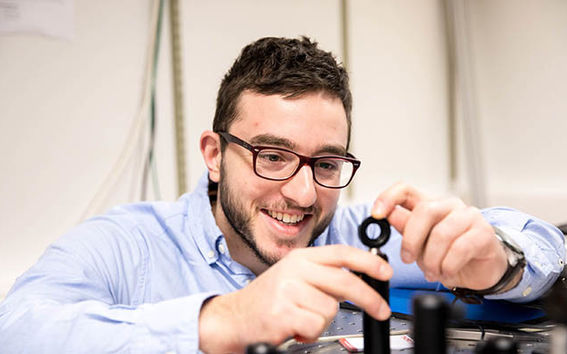Marie Skłodowska-Curie Fellowship awarded to fabricate an organic polariton laser diode

A laser diode is a device in which electric current is applied to generate laser light, and because of its compact size (from few micrometers to few millimetres), it is the most common type of laser. However, most laser diodes consist of expensive inorganic semiconductors that are difficult to process.
Researcher Konstantinos Daskalakis is working in an exciting research project which aims to combine the advantages of organic semiconductors and polariton condensation to fabricate an organic laser diode.
‘Organic semiconductors are inexpensive and emit laser light at a wide range of wavelengths but they behave mostly as insulators. Practically, a “conventional” organic laser diode will require such high activation power that will break it down. This is why, despite the huge effort of researchers, there are no reports of an organic laser diode, yet,’ explains Dr. Daskalakis.
Dr. Daskalakis intends to address this weakness of organic diodes by implementing an alternative approach to the generation of laser light, called polariton condensation. Polaritons are bosonic quasiparticles (bosons), which are based on the hybridization between light and matter. Under the right conditions, polaritons can condense and produce laser-light emission – or polariton laser for short. A great advantage of polariton lasers is that they require thousand-times lower activation powers compared with typical lasers.
‘The implementation of the polariton lasing mechanism in organic semiconductors can effectively reduce the activation powers of organic laser diodes and lead to the first demonstration of an organic laser diode,’ says Dr. Daskalakis. He is very excited: ‘Once successful, the low cost and ease of organic laser diode fabrication will be a big breakthrough in the semiconductor and laser diode industries and research.’
The device has another potential use. Polariton condensates in organic semiconductors can show superfluidity and physics similar to Bose-Einstein condensates at room temperature. Usually such studies of quantum phenomena require ultra-low temperatures, but now thanks to polariton condensation, they can be studied at room temperature.
Konstantinos Daskalakis did his PhD at Imperial College London, where his group pioneered polariton lasing in organic semiconductors under optical pumping. Now the Marie Skłodowska-Curie Fellowship funding allows him to continue his research at Aalto University where he is part of the research team of Academy Professor Päivi Törmä.
‘I look forward working on this extremely exciting project. We can combine our expertise at Aalto on strong coupling and quantum phenomena with that of Dr. Daskalakis on polariton condensates,’ says Prof. Törmä.
Website of the Quantum Dynamics research group
Read the story of another researcher, Pablo Burset, who has as well been awarded the Marie Skłodowska-Curie Fellowship.
Marie Sklodowska-Curie actions Individual Fellowships provide grants for experienced researchers to support their mobility, research projects and training both within and outside Europe. The scheme covers all research areas and is meant for researchers with doctoral degree or at least four year’s full-time research experience.
Read more news

Get to know us: Associate Professor Maria Sammalkorpi
Sammalkorpi received her doctorate from Helsinki University of Technology 2004. After her defence, she has worked as a researcher at the Universities of Princeton, Yale and Aalto.
Aalto computer scientists in ICML 2024
Computer scientists in ICML 2024
Getting bacteria into line
Physicists use magnetic fields to manipulate bacterial behaviour